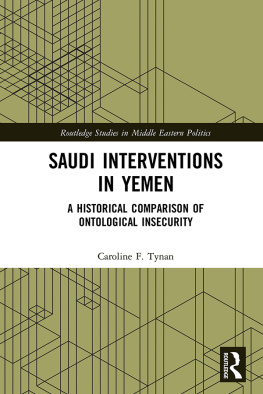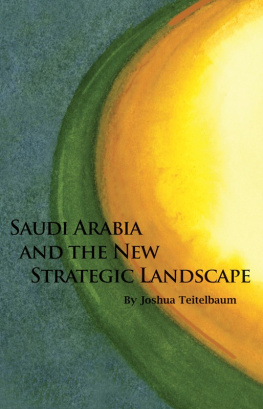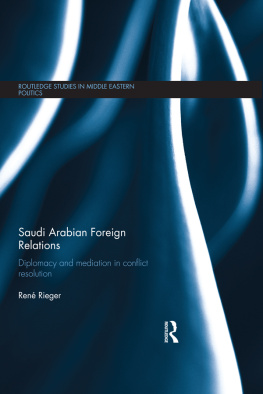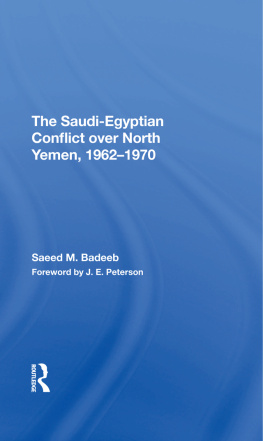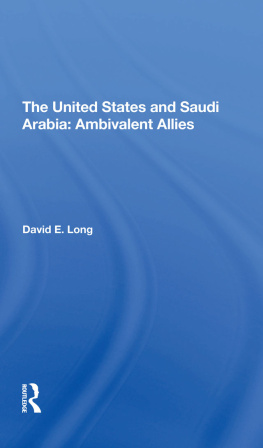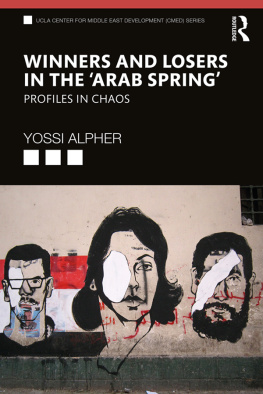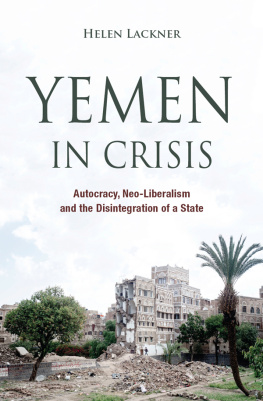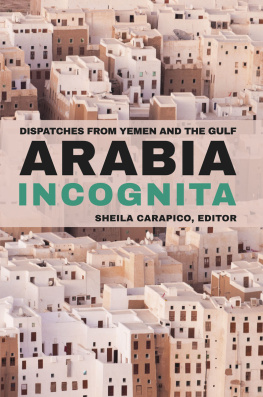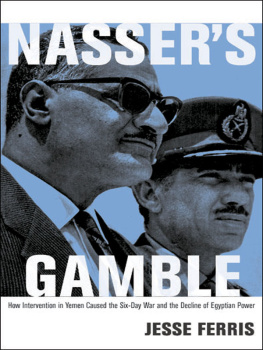Saudi Interventions in Yemen
This book explains the Saudi decision to launch a direct military intervention in Yemen in 2015 by comparing it with the monarchys response to Egyptian intervention into Yemen in 1962. It does so through the lens of domestic politics by tracing the monarchys response to the opposition in both time periods, and how this was informed by the different regional contexts of the 1960s and the 2011 Arab Spring.
The study argues that Saudi Arabia enhanced its own institutions, including a pan-Islamic ideological justification to rule, in response to aggression from Egypt and its revolutionary pan-Arab ideology. This contributed to a relatively cautious Saudi foreign policy in response to regional threats from Arab nationalism, along with a strategy of co-optation within the kingdom. In contrast, the non-ideological threat embodied in the Arab Spring posed a more existential danger to Saudi legitimacy. The new crown prince manipulated the regimes sense of anxiety from this to consolidate power through further scapegoating of the Shia minority, exacerbated tensions with foreign rivals, and, most blatantly, the 2015 intervention in Yemen.
Comparing Saudi foreign policy changes from the Arab nationalist period to the post-Arab Spring period, this volume is a valuable resource for scholars and students interested in political science, history, international relations and Middle East politics.
Caroline F. Tynan is currently an ACLS/Mellon postdoctoral research fellow at the Committee to Protect Journalists in New York, where she works to identify long-term trends in legal, discursive, and physical threats to journalists around the world. Her research interests include the dynamics of authoritarianism, regime transitions, and foreign policy, with particular focus on the politics of the MENA region.
ROUTLEDGE STUDIES IN MIDDLE EASTERN POLITICS
98. Religion and Hezbollah
Political Ideology and Legitimacy
Mariam Farida
99. Erdoans New Turkey
Attempted Coup dtat and the Acceleration of Political Crisis
Nikos Christofis
100. The Iraqi Kurds and the Cold War
Regional Politics, 1958-1975
Hawraman Ali
101. Islam, Jews and the Temple Mount
The Rock of Our/Their Existence
Yitzhak Reiter and Dvir Dimant
102. Saudi Interventions in Yemen
A Historical Comparison of Ontological Insecurity
Caroline F. Tynan
103. Middle Eastern Monarchies
Ingroup Identity and Foreign Policy Making
Anna Sunik
104. Nationalism and Islamism in the Kurdistan Region of Iraq
The Emergence of the Kurdistan Islamic Union
Mohammad Salih Mustafa
For a full list of titles in the series: https://www.routledge.com/middleeaststudies/series/SE0823
First published 2021
by Routledge
2 Park Square, Milton Park, Abingdon, Oxon OX14 4RN
and by Routledge
52 Vanderbilt Avenue, New York, NY 10017
Routledge is an imprint of the Taylor & Francis Group, an informa business
2021 Caroline F. Tynan
The right of Caroline F. Tynan to be identified as author of this work has been asserted by her in accordance with sections 77 and 78 of the Copyright, Designs and Patents Act 1988.
All rights reserved. No part of this book may be reprinted or reproduced or utilised in any form or by any electronic, mechanical, or other means, now known or hereafter invented, including photocopying and recording, or in any information storage or retrieval system, without permission in writing from the publishers.
Trademark notice: Product or corporate names may be trademarks or registered trademarks, and are used only for identification and explanation without intent to infringe.
British Library Cataloguing-in-Publication Data
A catalogue record for this book is available from the British Library
Library of Congress Cataloging-in-Publication Data
Names: Tynan, Caroline F., author.
Title: Saudi interventions in Yemen : a historical comparison of ontological insecurity / Caroline F. Tynan.
Other titles: Routledge studies in Middle Eastern politics ; 102.
Description: Abingdon, Oxon ; New York, NY : Routledge, 2020. |
Series: Routledge studies in Middle Eastern politics ; 102 | Includes bibliographical references and index.
Identifiers: LCCN 2020010848 | ISBN 9780367456382 (hardback) | ISBN 9781003024514 (ebook) | ISBN 9781000095623 (adobe pdf) | ISBN 9781000095661 (epub) | ISBN 9781000095647 (mobi)
Subjects: LCSH: Nationalism--Saudi Arabia--History--20th century. | Nationalism--Saudi Arabia--History--21st century. | Saudi Arabia--Foreign relations--Yemen (Republic) | Yemen (Republic)--Foreign relations--Saudi Arabia. | Saudi Arabia--Foreign relations--Egypt. | Egypt--Foreign relations--Saudi Arabia. | Saudi Arabia--Foreign relations--20th century. | Saudi Arabia--Foreign relations--21st century. | Saudi Arabia--Politics and government--20th century. | Saudi Arabia--Politics and government--21st century.
Classification: LCC DS228.Y4 T96 2020 | DDC 953.305/3--dc23
LC record available at https://lccn.loc.gov/2020010848
ISBN: 978-0-367-45638-2 (hbk)
ISBN: 978-1-003-02451-4 (ebk)
To Kay and Doug, the first ones to teach me that privilege must be used to give voice to the silenced
This book would not have been possible without the academic and personal support provided by mentors, colleagues, and friends. Sean Yomwho was there for me every step of the way from the beginningSamer Abboud, Sarah Bush, and Rosie Hsueh never failed to offer me their reassurances that I would make it through this process when I most needed it. In this projects early stages, Samer introduced me to similar works from emerging scholars around the region who challenge traditional theoretical perspectives of Middle East politics at the Arab Council for the Social Sciences first Summer Institute on Security Studies in the Arab World, in Lebanon in 2017.
In addition to my advisors and colleagues in political science, I owe immense gratitude to Temple Universitys Digital Scholarship Center. Through a year-long fellowship followed by continued employment at the DSC, I had the opportunity to learn new ways of gathering data, receiving insight from colleagues on my research topic. Special thanks go to Alex Wermer-Colan and Luling Huang, who both helped as I began to develop skills in collecting data from news and social media online through web scraping. With funds from the DSC, as well as a research grant from the Association for the Study of the Middle East and Africa, I was able to travel to London twice for interviews and an archives trip.
Above anyone, my deepest gratitude goes to my parents, Kay and Doug. The countless political discussions at home with both of them were always dually centered on intellectual curiosity and values of universal humanity. From an early age, my mother instilled in me a strong identification with issues of political and social justice, never failing to question the use of violence and war. Through his unwavering encouragement, my father helped me to believe in myself more and more over these last few years. I dedicate the efforts of this book to them both.
On March 26, 2015, a new Saudi defense minister, Prince Muhammad bin Salman, initiated the kingdoms first full-scale war since 1934 by launching an intervention into Yemen. Two years later the same prince replaced his cousin as heir to the throne, in the first major succession crisis since 1964. Both moves were unprecedented in one key respect: they were done without the approval of fellow senior members of the ruling royal family. Although Saudi Arabia had been interfering politically and militarily in Yemen for decades, the 2015 intervention marked a major break with its historical foreign policy of cautious reaction characterized by indirect interventions through checkbook diplomacy and reliance upon the UK and US for external military protection. Why would Saudi Arabia change its military approach to Yemen so drastically, when previous responses to external threats involved only indirect force? How might changing domestic threats shape its construction of external threats? Previous theories have connected the inner workings of regimes with proclivity for conflict initiation. Yet these theories have mixed findings on the role, if any, domestic politics might have in an authoritarian context. As a result, there is little consensus on what mechanisms within a regime might contribute to aggressive foreign policy.

